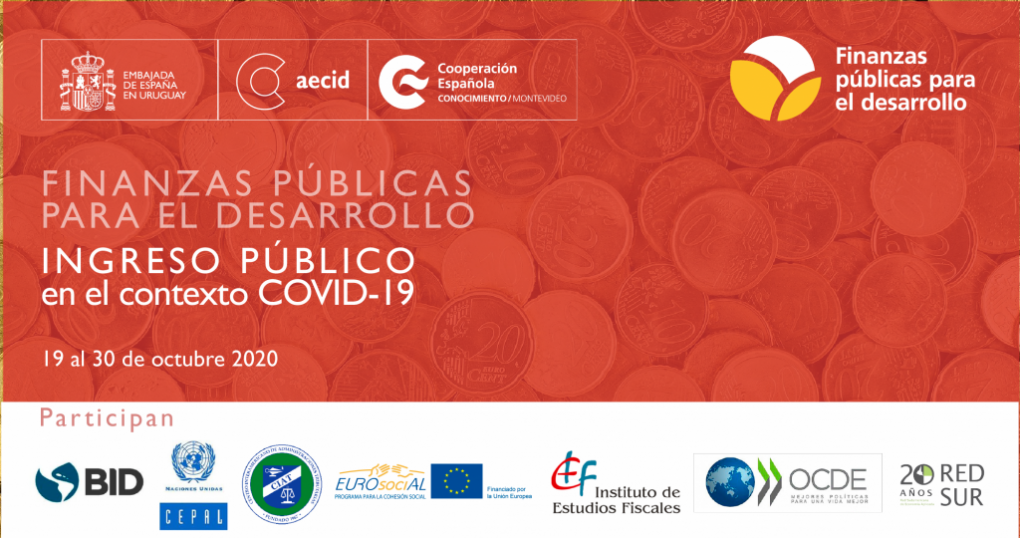The EU EUROsociAL+ programme, through its Governance Area Policies in FIIAPP, participated in the “Public finance for development - public revenue in the Covid-19 context” laboratory organised by the Spanish Cooperation Training Centre in Montevideo.

What key issues should be addressed in public revenue-taxation for the post-COVID recovery strategy? How can social cohesion be the compass to guide the design of these policies? How does dialogue between Europe and Latin America contribute to the search for joint solutions to face this crisis? These and other fundamental questions were addressed in the laboratory “Public finance for development – public revenue in the COVID-19 context”, an initiative organised by the Spanish Cooperation Training Centre – CFCE in Montevideo, with the participation of the EUROsociAL+ Programme’s Line of Action on Public Finance.
As Mercedes Flórez, Director of the CFCE in Montevideo, a Centre dependent on the Spanish Agency for International Development Cooperation – AECID in Uruguay, explained, “this laboratory is part of Spanish corporation’s joint response strategy against COVID and seeks, through the exchange of knowledge and experiences, to contribute to the improvement of the efficiency and effectiveness of fiscal policies to achieve the harmonisation of domestic resources and meet the demands of citizens without leaving anyone behind. These dialogue meetings seek to share knowledge in order to define an action plan on sustainable public finances with a regional vocation that will enable us to answer the question about which public finance scheme would need to be applied to build a better normality from now on.”
Alicia Bárcena, Executive Secretary of ECLAC, said that “it is a question of previewing criteria for enhancing tax administration and public revenue, particularly in a region with high tax evasion and low taxation.”
Juan Manuel Santomé, Director of EUROsociAL+, stressed that “from the European Union Programme we believe that this way out of the crisis must be inclusive and bet on social cohesion so as not to leave anyone behind. Tax relief measures are necessary and the debate on tax exemptions must be resumed.
Sonia González-Fuentes, coordinator of the EUROsociAL+ Democratic Governance Policies Area, added that fiscal policy “is an excellent instrument for reducing inequality, and is therefore crucial for a Programme like EUROsociAL+ that promotes social cohesion. It is important to define the bases for a renewed social contract. Fiscal pacts make up the aspect of internal social pacts that must be reached within countries and this means that when analysing possible fiscal reforms, we must also reflect on the type of social welfare model we want.”
10 recommendations on tax matters to face the COVID-19 crisis
In the presentation of the laboratory delivered by EUROsociAL+ the main conclusions of the Web Seminars Cycle “Fiscal Policies in the framework of the crisis due to COVID-19” were presented. This was organised in May 2020 by the Programme together with the Secretariat of Central American Social Integration – SISCA, and had the collaboration of the Executive Secretariat of the Council of Central American Finance Ministers of Panama and the Dominican Republic – Executive Secretariat-COSEFIN.
Beatriz García Beltrán, head of the Programme’s “Public Finance – Public Revenue” Line, listed some of the main conclusions that were highlighted by the participants, and which could be summarised as follows:
1.Fiscal policies require collection strategies; they cannot be financed with debt alone.
2. It is necessary to promote tax reforms that increase collection without affecting investment or consumption.
3. Flexibilisation and tax relief measures are required aimed at the most vulnerable groups and sectors.
4. It is possible to identify mechanisms to strengthen the tax burden without damaging economic activity.
5. The current crisis is an opportunity to reopen the debate on tax exemptions in Latin America.
6. It is necessary to create and/or strengthen digital taxes, green taxes, and selective taxes and charges; likewise, the tax burden on companies that are making extraordinary profits as a result of the crisis could be assessed.
7. It is essential to rethink a social pact where the fiscal component is fundamental, and where solidarity also addresses the tax dimension, putting the most vulnerable people and companies at the centre.
8. One of the fundamental axes is to achieve tax collection efficiency: fight against tax evasion and avoidance, apply BEPS (Base Erosion and Profit Sharing), and establish international agreements for the exchange of tax information.
9. The role of Tax Administrations is fundamental to guarantee public resources.
10. Fiscal policies are a central element to being able to implement universal, redistributive and supportive policies which contribute to development.
These conclusions were part of the reflections shared in the Web Seminars Cycle by Alain Cuenca, Director of the Institute of Fiscal Studies – IEF, Spain; Martín Portillo, Executive Secretary of the Council of Finance Ministers of Central America, Panama and the Dominican Republic – COSEFIN; Margarita Faral, Director of the General Tax Directorate – DGI, Uruguay; Rosa Cañete Alonso, Economist-specialist in inequality; María Dolores Almeida, Ex-Vice Minister of Finance, Ecuador and EUROsociAL+ consultant; Sebastián Nieto Parra, Unit Head for Latin America and the Caribbean of the Development Centre of the Organisation for Economic Cooperation and Development – OECD; Peggy Martinello, Director of the Area of Public Administration and Social Affairs – APAS of the International and Ibero-American Foundation for Administration and Public Policies – FIIAPP; Márcio F. Verdi, Executive Secretary of the Inter-American Centre of Tax Administrations – CIAT; and Marc Litvine, Head of Regional Programmes for Latin America of the Directorate General for International Cooperation and Development – DG DEVCO of the European Commission.



